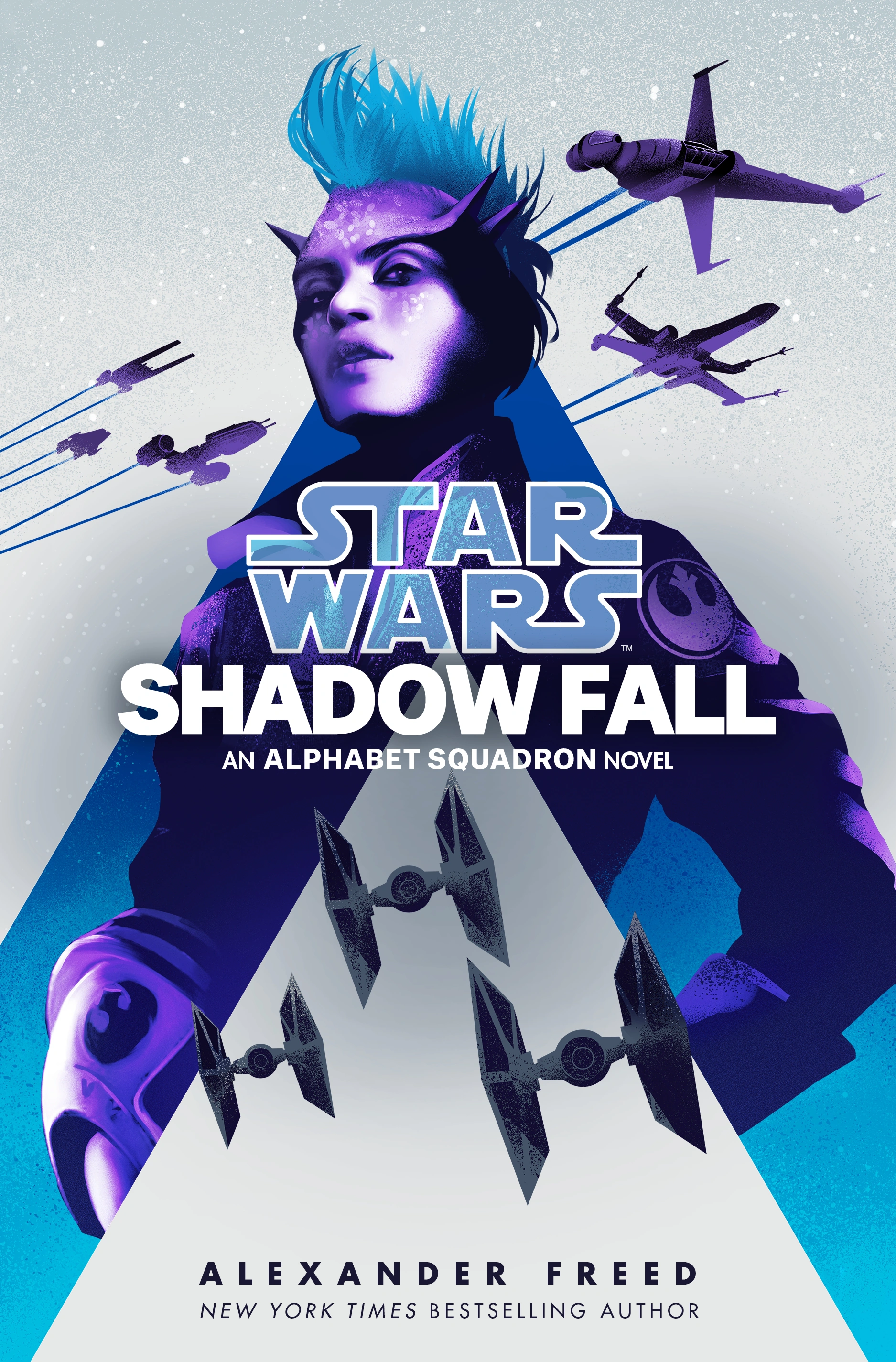Rejoice, my fellow Kairos stans—Shadow Fall, the sequel to last year’s excellent Alphabet Squadron, has arrived! Alexander Freed continues to pitch a perfect game with Shadow Fall, a novel packed with intricate action setpieces, internal conflict galore, and enough antiheroes to fill the next Game of Thrones book. Let’s take the book for a spoiler-free spin.

The first book in the series, Alphabet Squadron, was a big hit here at Nerds On Earth last year. When it debuted I wrote about the importance of Freed’s approach to storytelling in the Star Wars universe—he excels at blending the gritty details of hard sci-fi with deeply flawed, morally ambiguous characters. (The book also embraced the diversity of its characters’ backgrounds, races, relationships, and sexualities. That may not seem like a huge deal, but within the culture of Star Wars it was a huge step forward for inclusiveness.)
If you’ve ever wondered what the weeks and months after the Battle of Endor were like for the fledgling New Republic, wonder no more. If you ever wanted a spiritual successor to Michael Stackpole’s Expanded Universe X-Wing novels, look no further. Shadow Fall continues that tradition of excellence.
The Gang Gets Ripped Apart
Shadow Fall follows the first commandment of Star Wars storytelling: when in the second part of a trilogy, split the main characters up. The five pilots of Alphabet Squadron—Nath Tensent, Chass na Chadic, Wyl Lark, Kairos, and their commander, Yrica Quell—are scattered across the Cerberon system à la The Empire Strikes Back almost from the beginning of the story.
This allows Freed to play with different combinations of his characters, revealing fascinating relationships and unexpected moments of levity. Han and Luke’s rapport in the movies echoes in the brotherly affection (and distrust) of the young, winning Wyl Lark and weathered, dubiously moral Nath Tensent. Chass na Chadic, with her wild temper and not-so-secret deathwish, spends a significant amount of the book undercover with the peaceful hippies of a Force-worshipping cult.
All of the five members of Alphabet get some spotlight (once again, though, Kairos doesn’t get nearly enough attention—we want more!). But Freed saves the heavy lifting of the story for the disastrous odyssey on which Quelland the slightly reprogrammed torture droid IT-O embark to rescue New Republic intelligence agent Caern Adan. All three characters get caught in a black hole of intrigue and secrets that completely shifts the axis of the story for the final, upcoming conclusion to the trilogy.
The Keize Is Right
None of this would work without Soran Keize, an enemy worth the attention and skills of Alphabet Squadron. Keize takes up command of a shaken 204th Imperial Fighter Wing, better known as Shadow Wing, following its defeat at the Battle of Pandem Nai. Keize was a dedicated Imperial officer before the death of the Emperor but deserted Shadow Wing after the Battle of Endor. Seeing no future in the orphaned fragments of the Empire, he lived under assumed names and distanced himself from his former life.
By the beginning of Shadow Fall, Keize has been driven back to Shadow Wing by the relentless agents of the New Republic. His return to the fold reveals a crack group of ace TIE fighter pilots adrift and without a larger purpose. His decision to attack the New Republic forces on the planet Troithe—where Alphabet Squadron just so happens to lay a trap for Shadow Wing—is the major storyline of Shadow Fall.
Keize’s obvious disillusionment with the Empire he serves sets him apart from the typical antagonists in Star Wars novels. He’s no zealot, no starry-eyed acolyte of the Emperor, not even a pragmatic plotter like Grand Admiral Thrawn. The Emperor’s genocidal Operation Cinder, carried out with resolute dedication by the remaining Imperial fleets and fighter wings after Palpatine’s death, leaves no room for mercy in the New Republic.

Keize has no false impressions about the future for Imperials like himself. Even if he instills discipline and gives Shadow Wing a goal, a target, even a victory, the larger war is already lost for the Empire. His reluctant leadership of Shadow Wing will not end well, and Keize knows it. It makes him a grudging, intriguing villain.
A Walk On The Wild Side
Much of Shadow Fall’s interior space—the dialogue and the inner thoughts of the characters—revolves around the secrets that the characters hold. The book’s quiet moments are filled by labyrinths of thoughts they must navigate to defeat their own flaws. Each member of Alphabet hides something, whether it’s Wyl’s potentially permanently damaged pacifism or Chass’s unspoken fears of a life without war and missions.
The shaky unity and tentative friendships the pilots forged in the first novel are shattered, maybe irrevocably, in Shadow Fall. Freed is not afraid to linger on the inner monologues of every important character, even when it’s squirmy and uncomfortable to do so. Quell, Chass, and Keize get the lion’s share of this introspection, but Wyl, the roguish Nath, and even the mysterious Kairos all have their chances to wallow in their guilt and shame and confusion.
Are the members of Alphabet Squadron heroes? Most of the “good guys” in this book aren’t that good or even likable most of the time. Even the straight-laced and likable Wyl is so stuck in his own head and anxieties that he barely enjoys flying his A-wing. Nobody in Shadow Fall except for General Hera Syndulla fits the classic upstanding hero archetype (and she’s a breathe of fresh air every time she appears).
The gap between the hopes of the New Republic, embodied in General Syndulla, and and the murky moral reality that Alphabet Squadron inhabits is one of Shadow Fall’s greatest strengths. The story, like any good middle section of a trilogy, offers little in terms of resolution. But that makes the anticipation for Alexander Freed’s final novel in the series so much the sweeter.

